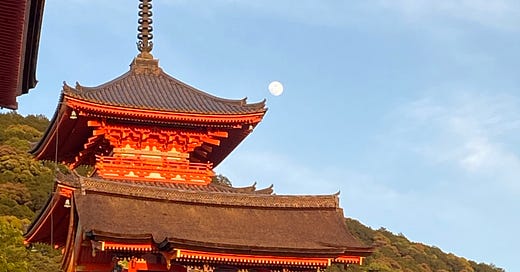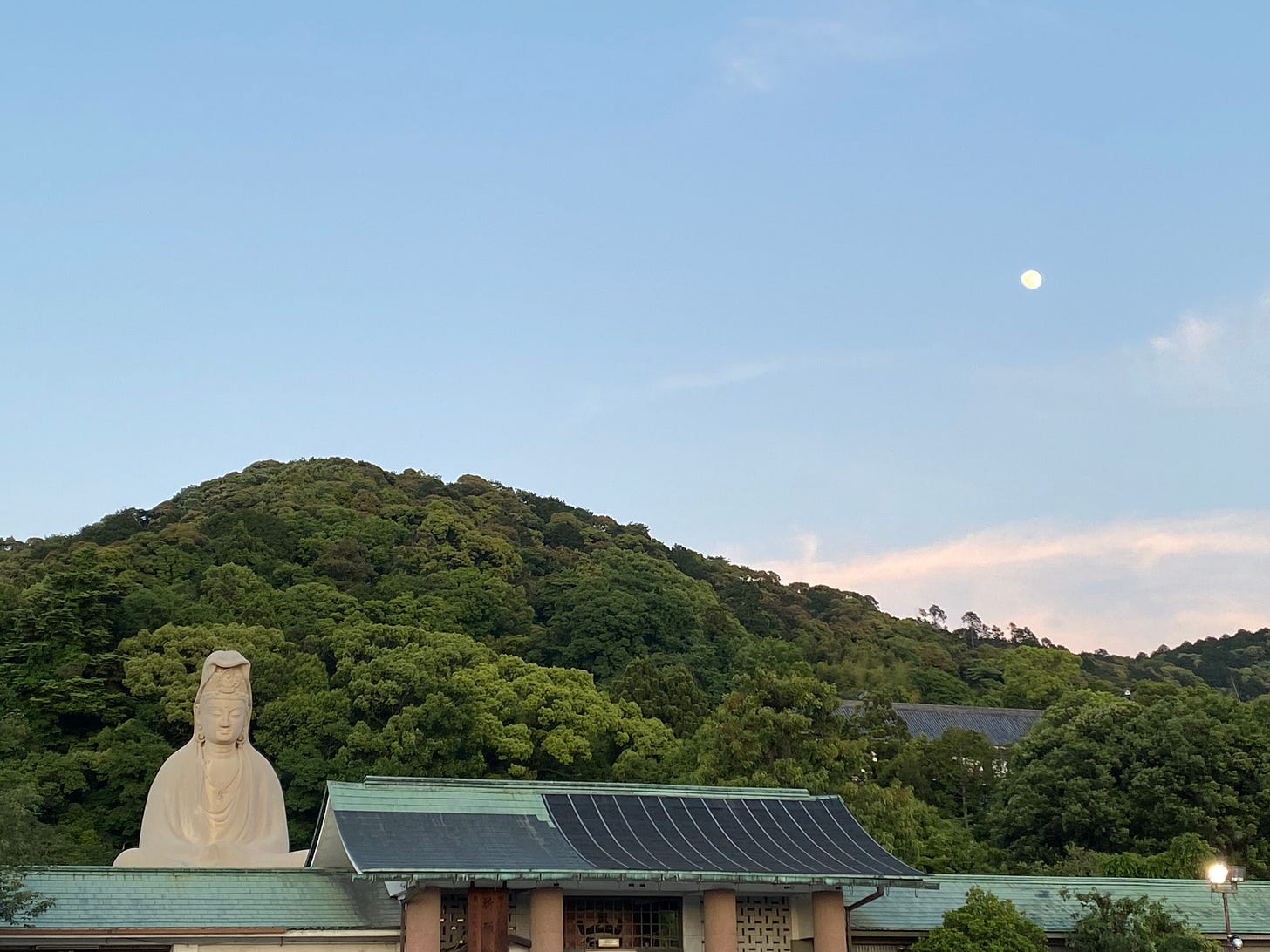“Even in Kyoto, I long for Kyoto.” -Matsuo Basho
I’ve only spent the equivalent of one month in Japan. My wife and I first went there together on our honeymoon, and again when she graduated from college. I consider myself highly fortunate and deeply grateful to be able to travel as much as I do, both for work and for leisure. There are certainly many more places on earth I’d like to see, but it’s hard to imagine anywhere will ever top Japan for us.
I’ve been a fan of Japanese popular culture since I was a kid, and my wife, who comes from a military family, actually lived there for a good chunk of her childhood. Tokyo is a marvel of modernity, something that must be seen to be believed. But to me, nothing beats the novel-but-familiar tranquility of Kyoto. There’s a phenomenon that Japanese poets have written about for centuries that translates to something like “missing Kyoto before you even leave.” I’m definitely familiar.
I could go on and on about what an awesome place it is. If people actually go to personalized heavens after they die, as is often portrayed in western pop culture, mine would probably look a lot like Kyoto - jogging along the canal, hiking the steep but scenic bluffs of Mt. Hiei, riding the nicest public transit on earth, and eating the best meals I’ve ever tasted for the equivalent of 18 US dollars after a short meditation session at one of the many Buddhist shrines or temples. Top it all off with a nice soak in the onsen, and I’m a happy guy. I’ve said it before and I’ll say it again, life just feels better in a place that’s designed for life.
I realize, of course, that utopia is a lie and no country is ever flawless. I also realize that living and working in Japan would not be the same experience as visiting for pleasure. There’s only so much you can learn about a place as a tourist.
One of Japan’s biggest flaws, in my view, has always been its tendency towards nationalism. Despite being more liberal than the US in certain ways, Japan is also a country that has historically been more wary of immigration than most US conservatives (though there are encouraging signs in Japan and worrying ones here that suggest this trend could be flipping in both countries).
I’m an unapologetic cosmopolitan. That’s partially because I grew up in a part of the US so homogeneous that even someone like me (of Eastern and Southern European decent) was viewed with suspicion. I distinctly remember getting pulled over and frisked by the cops as a teenager for not having my headlights on at dusk. They even sent a drug-sniffing dog into my car once and tried to pry a confession from me by saying that the dog had alerted them to the smell narcotics in the vehicle (there weren’t any, so either the dog was stupid or the cops were simply lying). I’m therefore someone who’s keenly aware of the fact that diversity makes everyone safer, because it’s harder to single out any one person as “different.” And given the high-benefit, low-cost nature of immigration (at least if you believe virtually all the economists who study its effects) one quickly realizes that anti-foreign bias is one of the most irrational biases people have.
And yet…
I remember one day in Kyoto, probably a weekend, pushing through a mass of clueless, selfie-stick wielding tourists crowding the beautiful Fushimi Inari shrine, I said to my wife, “I know it goes against all of my priors, but if I were a Japanese citizen, I’d probably support a law strictly limiting the number of foreigners allowed into the country at any given time, even though that would be terrible for us.” And indeed, many Japanese seem to be sharing that sentiment as a wave of obnoxious tourists continues causing problems for locals.
Now, obviously, arguments against rude tourists are not arguments against immigration, and even arguments that are against immigration are rarely persuasive or rooted in much evidence. So while I’m still just as much of an anti-nationalist as I’ve ever been, my experience in Japan allowed me to emotionally grok something I’d never been able to grok before. I was able to put myself in the shoes of the locals, seeing the influx of foreigners who disregard Japanese norms of politeness and consideration. I was able to imagine how annoyed I might feel, and the irrational conclusions such annoyance might lead me to (kick ‘em all out!).
Furthermore, I can honestly see how, if I’d grown up in a place as nice as Japan, I might feel more protective of the status quo than I do here in the US. In a place where “basically everything and everybody is nice” is the norm you grow up with, it’s not hard to see why people might be more resistant to change. I certainly don’t agree with this mindset any more than I ever did, but I think for the first time in my life, I can kind of grasp it at the gut level (the level at which most politics take place).
I’d like to think that this is a sign of growth on my part. The fact that I’m able to empathize at all with what I consider to be one of the worst cognitive biases is something I couldn’t have honestly said about myself five years ago. I never knew what it felt like to really love the country you grew up in, something I’m sure many other non-conservative Americans can relate to. To me, being proud of the country you happened to be born into seemed every bit as nonsensical as being proud of your height or eye color. I recall an old George Carlin quip about how nobody’s proud to be 5’11 (though of course, if you lived in a place with widespread bias against 5’11 people, one could see why a 5’11 pride movement might form in response). I guess I just had to find a place that I really loved and felt some affection for before I could finally grasp the desire to keep things frozen in amber.
To be clear, empathy is not an endorsement. But it is useful. What I would love to see more of in this country is people who understand the benefits of immigration making an affirmative case for why we need more of it. Clearly, wagging fingers at the anti-immigrant crowd has not weakened their resolve. Their fears may be unfounded, but shaming for it only seems to buttress their cause. Recall Richard Rorty’s most prescient warning:
“All the resentment which badly educated Americans feel about having their manners dictated to them by college graduates will find an outlet.”
In Buddhist philosophy, impermanence is identified as the root cause of most human suffering. We develop attachments to the things we like and convince ourselves that they’ll never change. I think this can explain a lot of conservative biases, from nativism to NIMBYism. But change is inevitable. Often difficult, but inevitable nonetheless. This is part of why I hate nostalgia - telling yourself that things were better in the good old days is not only inaccurate, it also makes you hate the present more. I think this can go along way in explaining the “everything’s amazing and nobody’s happy” phenomenon. If everyone from Boomers to Zoomers can convince themselves that things used to be great and now they suck, that seems like a perfect recipe for widespread dissatisfaction. Quite the ideal ecosystem for cynical politicians and outrage merchants, less so for the rest of us.
At any rate, I’m grateful to have a slightly better emotional understanding of this view I’ve never agreed with. Hopefully, it can make me a somewhat more mindful advocate for the pluralist values I hold dear.
Finally, if you’re ever fortunate enough to visit Japan, please try to show the same consideration for the locals that they’ll inevitably show you. Oh, and visit a 7/11. Seriously. Nothing better illustrates the differences between Japan and the US. It’s incredible.






